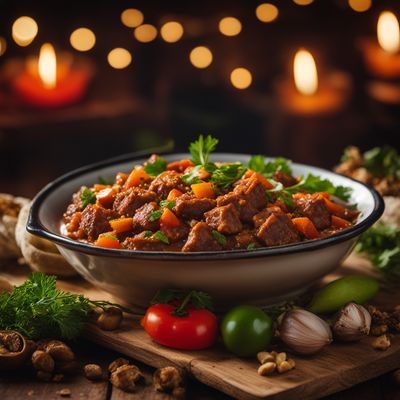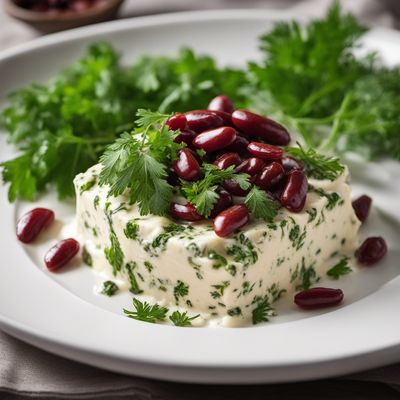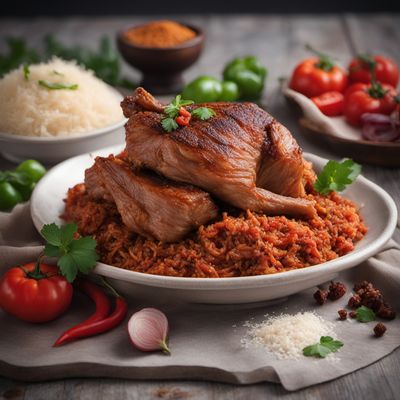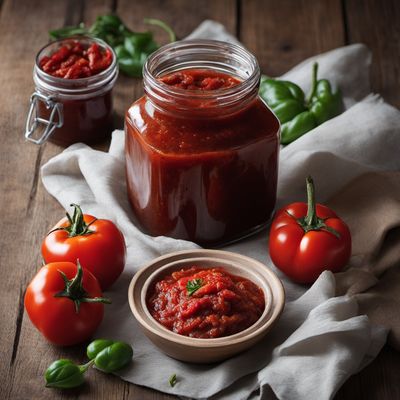
Cuisine
Bulgarian cuisine
Bulgarian cuisine is characterized by its use of simple, high-quality ingredients and traditional cooking methods. Many dishes are based on meat, particularly pork and beef, as well as a wide variety of vegetables, including tomatoes, peppers, and eggplant. Other common ingredients include onions, garlic, and various herbs and spices. Bulgarian cuisine is also known for its wide variety of breads and pastries, which are often served as accompaniments to main dishes or as snacks.
Typical ingredients
Pork, Beef, Tomatoes, Peppers, Eggplant, Onions, Garlic, Various herbs and spices, Breads, Pastries
Presentation and garnishing
Dishes are typically served in large portions, and are often garnished with fresh herbs or vegetables. Breads and pastries are also an important part of the presentation, and are often served warm and fresh from the oven.
The region is also known for its yogurt production, which is a staple of the Bulgarian diet and is often used in cooking and as a condiment.
More cuisines from this region...
Russian cuisine, Ukrainian cuisine, Romanian cuisine, Romani cuisine, Belarusian cuisine, Moldovan cuisine
History
Bulgarian cuisine has a long history dating back to the ancient Thracians, who were known for their agricultural practices and wine production. Over time, the cuisine evolved to incorporate influences from neighboring regions, as well as from Greece and Turkey. Today, Bulgarian cuisine is an important part of the country's cultural heritage, and is enjoyed by locals and visitors alike.
Cultural significance
Bulgarian cuisine is an important part of the country's cultural identity, and is celebrated at festivals and events throughout the year. Many dishes are associated with specific holidays or occasions, such as banitsa (a type of pastry) on Christmas Eve, or kavarma (a type of meat stew) on Easter.
Health benefits and considerations
Bulgarian cuisine is generally high in calories and fat, due to its heavy use of meat and vegetables. However, many dishes also contain a variety of herbs and spices, which provide important nutrients and antioxidants.
Bulgarian cuisine dishes Browse all »

Banitsa
Banitsa is a traditional Bulgarian pastry that is made with phyllo dough and a filling of cheese, eggs, and yogurt. It is often served for breakfast or as a snack.

Guvech
Vegetable stew
Guvech is a traditional Bulgarian dish that is made with a variety of vegetables and meat. This hearty stew is perfect for cold winter nights and is sure to warm you up from...

Makalo
Garlic dip
Makalo is a traditional dish from the Balkans that is made from mashed potatoes and garlic. It is a simple and hearty side dish that is often served with grilled meats or stews.

Snezhanka Salad
Snow White Salad
Snezhanka Salad is a Bulgarian salad made with yogurt, cucumbers, garlic, and dill. It is a light and refreshing dish that is perfect for summer.

Poliŭka
Poliuka
Poliŭka is a traditional Belarusian soup made with potatoes and mushrooms.

Mekitsa
Mekitsa is a traditional Bulgarian fried dough that is similar to a donut. It is made from a simple mixture of flour, yeast, sugar, and milk, and is typically served for...

Banitsa sas sirene
Banitsa sas sirene is a traditional Bulgarian dish made with phyllo dough and feta cheese. It is a popular breakfast dish in Bulgaria and is often served with yogurt or ayran.

Kavarma
Kavarma is a traditional Bulgarian dish that is typically made with pork or beef and a variety of vegetables. It is a hearty and flavorful dish that is perfect for cold winter nights.
Bulgarian cuisine recipes Browse all »

Bulgarian Cheese and Spinach Pastry
Savory Delight: Bulgarian Cheese and Spinach Pastry

Karnacheta - Bulgarian Grilled Sausages
Sizzling Sausages: A Taste of Bulgaria

Bulgarian-style Karukan
Velvety Bulgarian Delight: A Twist on Karukan

Strandzhanka - Bulgarian Cheese and Egg Bread
Savory Delight: Bulgarian Strandzhanka - A Cheesy Egg Bread Extravaganza

Bulgarian Roasted Eggplant and Pepper Spread
Smoky Delight: Bulgarian Roasted Eggplant and Pepper Spread

Macheteadas with a Bulgarian Twist
Bulgarian Macheteadas: A Delicious Fusion of Honduran and Bulgarian Flavors

Homemade Lukanka Delight
Savory Bulgarian Lukanka: A Delightful Culinary Journey

Bulgarian Roasted Vegetable Salad
Savor the Flavors of Bulgaria: Roasted Vegetable Delight

Bulgarian-style Lace Pancakes
Delicate Bulgarian Lace Pancakes: A Twist on a Classic

Kazanlak Donuts
Bulgarian Rose-Scented Delights

Bulgarian-style Riesling Chicken Stew
Riesling-infused Chicken Delight: A Bulgarian Twist on a French Classic

Homemade Bulgarian Tomato and Pepper Spread
Savor the Flavors of Bulgaria: Homemade Lyutenitsa